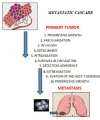Tumour progression and metastasis
- PMID: 26913068
- PMCID: PMC4754119
- DOI: 10.3332/ecancer.2016.617
Tumour progression and metastasis
Abstract
The two biological mechanisms that determine types of malignancy are infiltration and metastasis, for which tumour microenvironment plays a key role in developing and establishing the morphology, growth and invasiveness of a malignancy. The microenvironment is formed by complex tissue containing the extracellular matrix, tumour and non-tumour cells, a signalling network of cytokines, chemokines, growth factors, and proteases that control autocrine and paracrine communication among individual cells, facilitating tumour progression. During the development of the primary tumour, the tumour stroma and continuous genetic changes within the cells makes it possible for them to migrate, having to count on a pre-metastatic niche receptor that allows the tumour's survival and distant growth. These niches are induced by factors produced by the primary tumour; if it is eradicated, the active niches become responsible for activating the latent disseminated cells. Due to the importance of these mechanisms, the strategies that develop tumour cells during tumour progression and the way in which the microenvironment influences the formation of metastasis are reviewed. It also suggests that the metastatic niche can be an ideal target for new treatments that make controlling metastasis possible.
Keywords: cancer; epithelial–mesenchymal transition; infiltration; latency; metastasis; metastatic niche; microenvironment.
Figures


References
-
- Arvelo F, Poupon MF. Aspectos moleculares y celulares de la metástasis cancerosa. Acta Cient Venez. 2001;52:304–12. - PubMed
-
- Langley RR, Fidler IJ 2007. Tumor cell-organ microenvironment interactions in the pathogenesis of cancer metastasis. Endocr Rev. 28:297–321. - PubMed
-
- Talmadge JE, Benedict K, Madsen J, et al. Development of biological diversity and susceptibility to chemotherapy in murine cancer metastases. Cancer Res. 1984;44:3801–5. - PubMed
Publication types
LinkOut - more resources
Full Text Sources
Other Literature Sources
